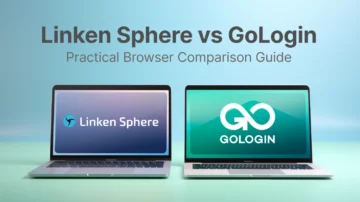Proxies are one of the best ways to ensure your online activity remains private. There are so many proxies today, some basic while others are advanced. In this HTTP vs. SOCKS5 comparison review, find out the differences between these two popular proxies, the nuts and bolts, and each proxy’s suitability. But before going into the details, here is an overview of proxies and what they do.
What are Proxies?
Proxy servers in computer networking, refers to a gateway between your device and the internet resource. In other words, a proxy is an intermediary server that separates website users from the website they browse. Proxy servers offer several security, anonymity, functionality, and privacy levels depending on the user’s needs. The latest proxy servers do more than forwarding users’ web requests. They also double up as firewalls and web filters, and besides, they cache data, consequently speeding up common requests.
How Do Proxies Work?
Each computer has a unique identifier known as an Internet Protocol (IP) address . This is like your street address, which helps the mail guy locate your residence. In this case, it’s the IP address that enables the internet to send the correct data to the correct computer.
Without the proxy server, your IP address is visible on the internet. That’s where proxies come in. A proxy server is just a computer of its own with an IP address. Now, instead of your computer or device forwarding direct requests to the internet resource, the proxy server takes the request from your device and sends it to the internet resource on your computer’s behalf. The feedback is then channeled back to your device via the proxy server. This way, you remain anonymous as your IP address is masked.
Proxy servers may tweak the data sent from your computer and still; get you the right information. Proxy servers also tweak IP addresses to mask your identity from web servers. They can also encrypt data when in transit, and lastly, they can block access to some web pages based on the IP address.
Proxies vs. VPNs
From their applications, proxies are quite similar to VPNs. So, what makes proxies different from VPNs? Well, the main difference between the two is that proxies are designed for basic functions such as anonymous web browsing and circumventing geo-restrictions, but they are not as secure. On the other hand, VPNs encrypt and secure all data. While VPNs are different from proxies, they can be used together to beef up anonymity.
Types of Proxies
Proxies have been evolving to meet the different demands of users. In this section, we have listed some of the most popular types of proxies and their specialty.
- POP3, SMTP, and IMAP Proxies – These are tailored for sending and receiving emails.
- CGI Proxy – Also known as anonymizer proxies, these are designed for opening any website without any configuration or settings whatsoever.
- FTP Proxies – As the name suggests, these are proxies meant for loading data to FTP servers.
- HTTP and HTTPS Proxies – These are proxies custom-designed for web browsing.
- SOCKS Proxy – These are used to send data to the server destination on behalf of the user client.
Another classification of the different types of proxies is based on functionality. Below are the different types of proxies based on how they work.
- Transparent Proxy – These proxies tell the internet resource (websites) that it is a proxy server and will leak your IP address. They are ideal for text filtering.
- Anonymous Proxy – As the name suggests, these proxies identify themselves to websites as proxies but will not leak your IP address.
- Distorting Proxy – These proxies are similar to anonymous proxies in that they identify themselves as proxies but instead of hiding your IP address, they pass false IP addresses.
- High Anonymity Proxy – As the name suggests, these offer the highest anonymity levels by changing IP addresses frequently, making it difficult for websites to track what traffic belongs to which IP address.
While all the proxies have specific applications, HTTP and HTTPS, and Socks proxies are the most popular proxies. Before comparing the two, let’s first find out a few things about the two proxies, and importantly, their pros and cons.
About HTTP/HTTPS Proxy
Even with the introduction of SOCKS5, HTTP and HTTPS remain the most popular proxies. HTTP is the abbreviation for Hypertext Transfer Protocol.
The main purpose of using HTTP proxy is to organize the working of browsers and other programs that rely on the TCP protocol. In other words, these are programs that use the Standard ports 80, 8080, 3128. HTTP and HTTPS proxies work in a pretty straightforward manner. The program, in this case, the browser sends requests to the proxy server for opening a particular resource (URL). Then, the server receives the data and sends it to your browser.
As you may be aware, we have HTTP and HTTPS. The difference between HTTP vs. HTTPS is that the former is a non-secured proxy while the latter is a secured proxy. HTTPS proxies, also referred to as HTTP over TLS or HTTP over SSL, are used for secure connections, say when submitting your credit card details and other sensitive data.
Applications of HTTP/HTTPS Proxies
As mentioned earlier, the HTTP and HTTPS proxies are the most commonly used proxies. They offer a wide range of applications, including;
- Caching downloaded media to enhance website performance.
- Restricting access to some web resources, for example, adult sites.
- Filtering out some types of text, for example, heavy banners that might slow down website speeds.
- Limiting connection speeds Keeping logs of web visitors and monitoring traffic.
About SOCKS Proxy
SOCKS is the abbreviation for Socket Secure, a networking protocol that routes network traffic through a firewall, thereby facilitating communication with servers. SOCKS, unlike HTTP/HTTPS, don’t moderate HTTP-header, and the servers will transmit data through themselves without altering a thing.
Today, SOCKS is the most advanced data transfer protocol and is specially tailored for programs that don’t support the use of proxy directly. These are programs that utilize standard ports 1080, and 1081. SOCKS proxy has evolved from the original SOCKS to SOCKS4 and the most recent advancement SOCKS5. So, what’s the difference?
Well, SOCKS4 proxy servers only support TCP connections, while the newer SOCKS5 servers support UDP, TCP, authorization by login & password, and remote DNS-query. For the record, SOCKS is a completely anonymous proxy.
Just like HTTP/HTTPS, there are specific applications of SOCKS proxies, as discussed below.
- Circumventing internet blocks such as IP bans.
- Providing faster and more reliable internet connections.
- Enhancing faster download speeds in P2P sharing websites.
- SOCKS proxies have fewer errors and inaccuracies and boost overall performance.
HTTP Proxy vs. SOCKS Proxy
There you have it, folks, an overview of the two proxies; HTTP/HTTPS and SOCKS. Now, onto the main business of the day; how do the two proxies compare? That’s what this section is all about.
To make sure that you get the most out of this comparison review, we have put the two proxies in a face-to-face comparison based on crucial factors such as functionality, speeds & performance, security, and privacy, usability, and, importantly, pricing.
1. Functionality
One thing about proxies is that they are highly specialized. This means they vary in terms of functionality. In this section, find out how HTTP/HTTPS proxies compare to SOCKS proxies.
HTTP proxies function using the HTTP protocol only and are best suited for activities involving retrieving information and data via web browsers. HTTP and HTTPS proxies operate on a higher level than SOCKS proxies. This enables them to decode the traffic being sent over a TCP connection.
On the other hand, SOCKS proxies don’t use HTTP protocol and are considered lower-level proxies. The fact that SOCKS functions don’t use the HTTP protocol means anyone can view the information being passed across. This is why SOCKS proxies are used for general purposes only and not airtight online security . One thing about SOCKS proxies is that they are very versatile. It sits at the 5th layer between layer 4 (TCP/UDP) and layer 7 (SSL), giving them the ability to handle different requests, including HTTP/HTTPS, SMTP POP3, and FTP. Consequently, they can be used for email forwarding, P2P sharing, file transfers, and more.
2. Speed and Performance
One of the applications of proxies is boosting speed and performance. But then, the speed and performance of proxies vary from one type to another. If you want a proxy that doesn’t compromise on speed and performance, this section tells it all. Find out which proxy is faster between HTTP proxy vs. SOCKS proxy.
There are different types of HTTP proxies; public proxies, shared proxies, and elite proxies. These three HTTP proxies have different speeds as determined by their functionality. Most of the public proxies out there are free, and that means they are ever overloaded. The fact that hundreds or thousands of people could be trying to use the proxy slows down speeds. Shared proxies, on the other hand, have favorable speeds because they have a lesser number of users compared to public proxies. The speeds of HTTP shared proxies are mostly as advertised by the provider. Last is elite proxies which, as the name suggests, have been optimized to offer the fastest connections.
Generally, SOCKS proxies offer faster speeds because, from a computational perspective, these proxies need less coding to run. Even though the difference in speed can’t be noticed easily, SOCKS has the upper hand, especially when transferring or downloading data online. This is the reason why the likes of BitTorrent and other torrent client software use SOCKS proxies.
3. Online Security and Privacy
One of the reasons we use proxies is for our online security and privacy . Proxies can give us anonymity, but then, they vary from one proxy to another. Below is a comparison of the levels of online security and privacy offered by these two proxies.
SOCKS proxies offer better security and privacy based on the fact that the proxy can’t read the data being passed via the server and client. Ideally, what happens, SOCKS uses a tunneling method that uses express permission called a handshake to open and close the tunnel. With SOCKS, one thing guarantees security; the data is highly secured courtesy of tunneling, and more so, the tunnel is highly secured. There are low chances of your data being viewed by websites when using a SOCKS proxy.
In the case of HTTP proxies, online security and privacy is a little bit compromised. The major reason why HTTP proxies are not considered secure is that they are smart enough to understand and decode traffic. What this means is that the data and information exchanged between you and the client can be seen by the HTTP proxy. The proxy doesn’t factor in the sensitivity of the data; it will still read it. The only way to use HTTP proxy with guaranteed security is by establishing tunnel connections.
The safest and most anonymous way to bypass IP ban and mask other parameters is the anti-detection browser. It is perhaps the fastest and most convenient solution to the issue of guaranteed anonymity, but the price is the highest. But this solution is suitable for those who really need to bypass IP bans.
4. Compatibility
We use proxies with different tools and extensions. So, when choosing the best proxy, we need to ascertain the compatibility of the particular proxy. In this section, let’s assess the compatibility of HTTP vs. SOCKS.
HTTP proxy servers are the best when it comes to compatibility as they connect with almost every tool, be it in the field of security, business, multimedia, etc. When it comes to ports, it’s important to note that HTTP uses only port 80, while HTTPS uses port 443.
Unfortunately, for SOCKS proxies, the compatibility with 3rd party tools is not as extensive. It connects with just a few tools. But the good thing is that it offers versatility when it comes to setup. The proxy’s default port is 1080, but unlike HTTP and HTTPS, SOCKS proxies can use any port on your system.
Wrapping Up
There you have it, folks, a discussion on what makes SOCKS proxies different from HTTP. Well, while the two have so many things in common, the differences are profound. In the case of which is the best proxy between SOCKS vs. HTTP, there is no definite answer. Essentially, there is no contest at all because the two are highly specialized proxies, each with specific applications.
The bottom line, however, is that HTTP proxies are the most common proxies and are affordable. They have inbuilt encryption systems that can read data and reveal information making them less secure. On the other hand, SOCKS proxies are secure as they don’t read data. Interestingly, the latest version of SOCKS, SOCKS5, supports UDP and several authentication methods.


